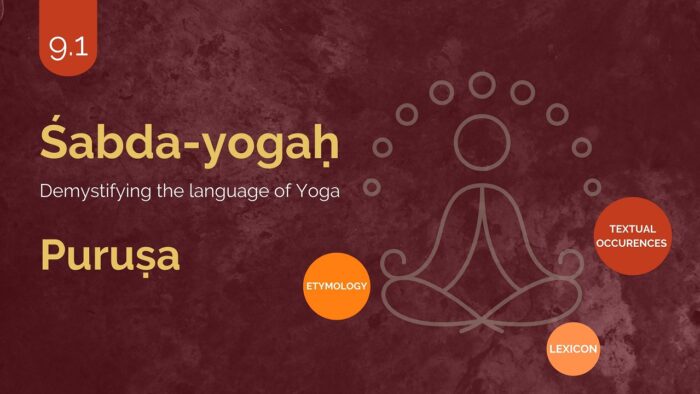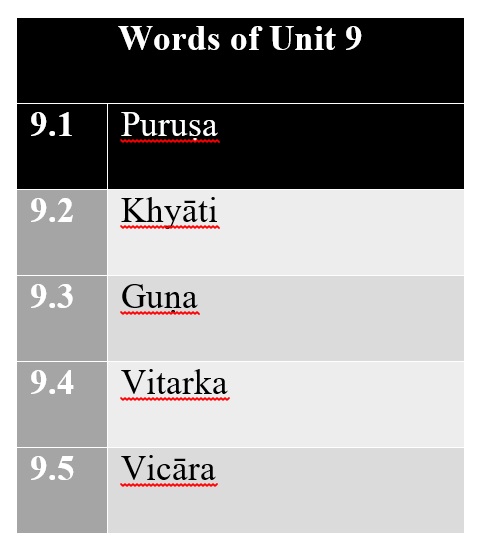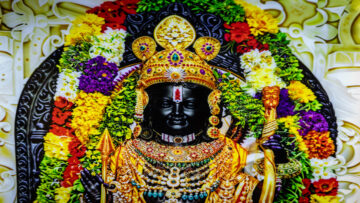Introduction
In this series, Yogic terminologies will be taken up and their –
- Etymological analysis,
- Lexical descriptions and
- Textual occurrences in Yogic literature and their commentaries, as available, will be presented. And finally observations will be made on the references.
Three texts – Yogasūtra, Haṭha-yoga-pradīpikā and Bhagavad-gītā are consulted for textual occurrences portion.
Śabda-yoga is intended to help students, teachers, and professionals of Yoga to develop a sound grammatical, contextual, and thereby an authentic and immersive understanding of Yoga terminologies.
List of Words
We will take up important Yogic terms from Sūtras 1.15 – 17. The terms that will be analyzed in this Unit are –
Etymology
पुर + कुषन् = पुरुषः
pura + kuṣan = puruṣaḥ
- The root word is पुरअग्रगमने-puraagragamane (to proceed, to lead, to go ahead)
- The suffix is – कुषन्kuṣan it brings in the meaning the doer – कर्त्रर्थ-kartrartha. This suffix is added according to the rule पुरःकुषन्puraḥkuṣan (उणादिपाठःuṇādipāṭhaḥ 4.74)
The derivative statement, then, would be – पुरतिअग्रेगच्छतीतिpuratiagregacchatīti – the one who goes ahead.
Lexicon
There are four references from amarakośa. They are as follows –
1) क्षेत्रज्ञआत्मापुरुषः 1.4.29
kṣetrajñaātmāpuruṣaḥ
The words kṣetrajña, ātmā and puruṣa are used to indicate the Soul/Consciousness.
2) पुन्नागःपुरुषः 2.4.25 –
punnāgaḥpuruṣaḥ
Puruṣa also refers to a flower tree also called punnāga (mesuaferrea or Rottleriatinctoria or CalophyllumInophyllum)
3) पुरुषाःपूरुषानरः – 2.6.1
puruṣāḥpūruṣānaraḥ
The words puruṣa, pūruṣa and nara refers to a Man.
4) पुरुषावात्ममानवौ – 3.3.219
puruṣāvātmamānavau
The word puruṣa refers to the consciousness and also a human being.
Thus as evident from these references the word puruṣa is used to indicate four meanings – a) the consciousness, b) a flower tree, c) a man and also d) human being. It will be interesting to note the meanings that the Yoga texts adopt from among these.
Textual Occurrences
Yogasūtra
There are7 occurrences of the word Puruṣa in this text. Except the second chapter, the word is present in all the other three chapters. A chapter-wise summary is presented below
Pāda 1
तत्परंपुरुषख्यातेर्गुणवेतृष्ण्यम्॥१.१६॥
क्लेशकर्मविपाकाशयैरपरामृष्टःपुरुषविशेषईश्वरः॥१.२४॥
tatparaṃpuruṣakhyāterguṇavetṛṣṇyam .. 1.16 ..
kleśakarmavipākāśayairaparāmṛṣṭaḥpuruṣaviśeṣaīśvaraḥ .. 1.24..
In sūtra 1.16 the knowledge of Puruṣa (consciousness) is stated as a component of higher vairāgya. In Sūtra 1.24 Īśvara is denoted as a special Puruṣa.
Pāda 3
सत्त्वपुरुषयोरत्यन्तासंकीर्णयोःप्रत्ययाविशेषोभोगःपरार्थात्स्वार्थसंयमात्पुरुषज्ञानम्॥३. ३५॥
सत्त्वपुरुषान्यताख्यातिमात्रस्यसर्वभावाधिष्ठातृत्वंसर्वज्ञातृत्वंच॥३. ४९॥
सत्त्वपुरुषयोःशुद्धिसाम्येकैवल्यमिति॥३. ५५॥
sattvapuruṣayoratyantāsaṃkīrṇayoḥpratyayāviśeṣobhogaḥparārthātsvārthasaṃyamātpuruṣajñānam .. 3. 35 ..
sattvapuruṣānyatākhyātimātrasyasarvabhāvādhiṣṭhātṛtvaṃsarvajñātṛtvaṃ ca .. 3. 49 ..
sattvapuruṣayoḥśuddhisāmyekaivalyamiti .. 3. 55 ..
In sūtra 3.35 the method of svārtha-saṃyam (practice of dhāraṇādhyāna and samādhi on consciousness) – attain the knowledge of consciousness is mentioned. Puruṣa here is described in Sage Vyāsa’s commentary as – चितिमात्ररूपः पुरुषः – citimātrarūpaḥpuruṣaḥ – Puruṣa is only consciousness. In Sūtra 3.49 the attainment of knowledge of the difference between the intellect and the Puruṣa is said to bestow the ability to control every being and omniscience. In Sūtra 3.55 – it is stated that Kaivalya is attained when the Sattva (intellect) and Puruṣa are equally cleansed. Sage Vyāsa the commentator clarifies that the Sattva (intellect) becomes pure being bereft of Rājasic and Tāmasic tendencies and the Puruṣa is stated as pure when he is understood as pure consciousness alone.
Pāda 4
सदाज्ञाताश्चित्तवृत्तयस्तत्प्रभोःपुरुषस्यापरिणामित्वात्॥४.१८॥
पुरुषार्थशून्यानांगुणानांप्रतिप्रसवःकैवल्यंस्वरूपप्रतिष्ठावाचितिशक्तिरिति॥४.३४॥
sadājñātāścittavṛttayastatprabhoḥpuruṣasyāpariṇāmitvāt .. 4.18..
puruṣārthaśūnyānāṃguṇānāṃpratiprasavaḥkaivalyaṃsvarūpapratiṣṭhāvācitiśaktiriti .. 4.34 ..
Sūtra 4.18 describes the unchanging nature of the consciousness. It is so because, the actions of citta are always known by the consciousness (as consciousness is always reflected in the citta). In Sūtra 4.34 which is the final Sūtra in the text it is stated that – when the Gunas become bereft of purpose (serving the Puruṣa), their Pratiprasava happens – they go back to their causal state. This is the state of Kaivalya where the pure consciousness is finally established in its nature.
Bhagavadgītā
There are 27 references in this text on the usage of the term Puruṣa. In ten chapters – 2, 3, 8, 9, 10, 11, 13, 15, 17, 18 – the utilization of the term could be seen. A chapter wise summary of the occurrences is presented below
Chapter 2
यंहिनव्यथयन्त्येतेपुरुषंपुरुषर्षभ।
समदुःखसुखंधीरंसोऽमृतत्वायकल्पते॥२.१५॥
वेदाविनाशिनंनित्यंयएनमजमव्ययम्।
कथंसपुरुषःपार्थकंघातयतिहन्तिकम्॥२.२१॥
यततोह्यपिकौन्तेयपुरुषस्यविपश्चितः।
इन्द्रियाणिप्रमाथीनिहरन्तिप्रसभंमनः॥२.६०॥
yaṃ hi navyathayantyetepuruṣaṃpuruṣarṣabha .
samaduḥkhasukhaṃdhīraṃso’mṛtatvāyakalpate .. 2.15 ..
vedāvināśinaṃnityaṃyaenamajamavyayam .
kathaṃsapuruṣaḥpārthakaṃghātayatihantikam .. 2.21 ..
yatatohyapikaunteyapuruṣasyavipaścitaḥ .
indriyāṇipramāthīniharantiprasabhaṃmanaḥ .. 2.60 ..
In these three verses two expressions – Puruṣa and puruṣarṣabha are found. Puruṣarṣabha– best among the men – is an exclamatory expression used to address Arjuna by Śrīkṛṣṇa.
In all the other three verses the word Puruṣa is used to indicate the meaning – a person. A person (Puruṣa) who is afflicted by senses and their contact of the senses and their objects attains immortality (2.15). A person (Puruṣa) who knows the consciousness is indestructible, eternal and unchanging – how or who will he harm or kill? (2.21). A wise person (Puruṣa) who is striving (to attain control over the senses) – his senses will revolt and snatch the mind away (towards their respective objects) (2.60)
Chapter 3
नकर्मणामनारम्भान्नैष्कर्म्यंपुरुषोऽश्नुते।
नचसंन्यसनादेवसिद्धिंसमधिगच्छति॥३.४॥
nakarmaṇāmanārambhānnaiṣkarmyaṃpuruṣo’śnute .
na ca saṃnyasanādevasiddhiṃsamadhigacchati .. 3.4 ..
Here also the word Puruṣa is used to indicate a person. Śrīkṛṣṇa states that merely by desisting to act – a person does not become free from actions…
Chapter 8
अर्जुनउवाच—
किंतद्ब्रह्मकिमध्यात्मंकिंकर्मपुरुषोत्तम।
अधिभूतंचकिंप्रोक्तमधिदैवंकिमुच्यते॥८.१॥
अधिभूतंक्षरोभावःपुरुषश्चाधिदैवतम्।
अधियज्ञोऽहमेवात्रदेहेदेहभृतांवर॥८.४॥
अभ्यासयोगयुक्तेनचेतसानान्यगामिना।
परमंपुरुषंदिव्यंयातिपार्थानुचिन्तयन्॥८.८॥
प्रयाणकालेमनसाचलेन
भक्त्यायुक्तोयोगबलेनचैव।
भ्रुवोर्मध्येप्राणमावेश्यसम्य
क्सतंपरंपुरुषमुपैतिदिव्यम्॥८.१०॥
पुरुषःसपरःपार्थभक्त्यालभ्यस्त्वनन्यया।
यस्यान्तःस्थानिभूतानियेनसर्वमिदंततम्॥८.२२॥
arjunauvāca —
kiṃtadbrahmakimadhyātmaṃkiṃ karma puruṣottama .
adhibhūtaṃ ca kiṃproktamadhidaivaṃkimucyate ..8.1 ..
adhibhūtaṃkṣarobhāvaḥpuruṣaścādhidaivatam .
adhiyajño’hamevātradehedehabhṛtāṃvara .. 8.4 ..
abhyāsayogayuktenacetasānānyagāminā .
paramaṃpuruṣaṃdivyaṃyātipārthānucintayan .. 8.8 ..
prayāṇakālemanasācalena
bhaktyāyuktoyogabalenacaiva .
bhruvormadhyeprāṇamāveśyasamya
ksataṃparaṃpuruṣamupaitidivyam .. 8.10 ..
puruṣaḥsaparaḥpārthabhaktyālabhyastvananyayā .
yasyāntaḥsthānibhūtāniyenasarvamidaṃtatam .. 8.22 ..
Here (8.1) the word puruṣottama is being used by Arjuna to address Śrīkṛṣṇa. The meaning of the word Puruṣottama is later clarified in the Gītā itself as the Paramātman (15.17). It also means best among human beings.
In verse 8.4 Puruṣa is stated as Adhidaivatam (the entity in the divine plane). In this context Puruṣa is described by ĀcāryaŚaṅkarabhagavatpāda as – पुरुषःपूर्णम्अनेनसर्वमिति, पुरिशयनात्वा, पुरुषःआदित्यान्तर्गतोहिरण्यगर्भः, सर्वप्राणिकरणानाम्अनुग्राहकः – puruṣaḥpūrṇamanenasarvamiti, puriśayanātvā, puruṣaḥādityāntargatohiraṇyagarbhaḥ, sarvaprāṇikaraṇānāmanugrāhakaḥ – that by which everything is filled, the one sleeps in the PurīNāḍī, the divine person existing in the orb of brightness of the Sun- hiraṇyagarbha, the one who bless the sense organs of all beings.
In verse 8.8 it is stated that by practicing Yoga with single-pointed focus one attains the ultimate person/being (ParamaPuruṣa).
In Verse 8.10 also reference is made to the ParamPuruṣa. It is stated here – that divine ultimate entity has to be meditated upon during the time of departing from the body. Verse 8.22 also refers to Para Puruṣa. Here devotion – single pointed Bhakti is given as the means to attain that ultimate divinity.
Chapter 9
अश्रद्दधानाःपुरुषाधर्मस्यास्यपरन्तप।
अप्राप्यमांनिवर्तन्तेमृत्युसंसारवर्त्मनि॥९.३॥
aśraddadhānāḥpuruṣādharmasyāsyaparantapa .
aprāpyamāṃnivartantemṛtyusaṃsāravartmani .. 9.3 ..
Here the word puruṣa refers to person. Sri Śrīkṛṣṇa states – those persons who do not have faith (aśraddadhānāḥpuruṣā) in this dharma (knowledge of the Brahman and practices to attain it) do not attain me and they return to the path of world where death lurks.
Chapter 10
अर्जुनउवाच—
परंब्रह्मपरंधामपवित्रंपरमंभवान्।
पुरुषंशाश्वतंदिव्यमादिदेवमजंविभुम्॥१०.१२॥
स्वयमेवात्मनात्मानंवेत्थत्वंपुरुषोत्तम।
भूतभावनभूतेशदेवदेवजगत्पते॥१०.१५॥
arjunauvāca —
paraṃ brahma paraṃdhāmapavitraṃparamaṃbhavān .
puruṣaṃśāśvataṃdivyamādidevamajaṃvibhum .. 10.12 ..
svayamevātmanātmānaṃvetthatvaṃpuruṣottama .
bhūtabhāvanabhūteśadevadevajagatpate .. 10.15 ..
In verses 10.12 and 15 Arjuna address Śrīkṛṣṇa as Puruṣa and Purushottama. Both refer to the ultimate persona – the supreme consciousness. In the first instance, it has to be noted that the word Puruṣa has the adjectives śāśvata (eternal/permanent) divya (divine)
Chapter 11
एवमेतद्यथात्थत्वमात्मानंपरमेश्वर।
द्रष्टुमिच्छामितेरूपमैश्वरंपुरुषोत्तम॥११.३॥
त्वमक्षरंपरमंवेदितव्यं
त्वमस्यविश्वस्यपरंनिधानम्।
त्वमव्ययःशाश्वतधर्मगोप्ता
सनातनस्त्वंपुरुषोमतोमे॥११.१८॥
त्वमादिदेवःपुरुषःपुराणस्त्वमस्यविश्वस्यपरंनिधानम्।
वेत्तासिवेद्यंचपरंचधामत्वयाततंविश्वमनन्तरूप॥११.३८॥
evametadyathātthatvamātmānaṃparameśvara .
draṣṭumicchāmiterūpamaiśvaraṃpuruṣottama .. 11.3 ..
tvamakṣaraṃparamaṃveditavyaṃ
tvamasyaviśvasyaparaṃnidhānam .
tvamavyayaḥśāśvatadharmagoptā
sanātanastvaṃpuruṣomato me .. 11.18 ..
tvamādidevaḥpuruṣaḥpurāṇastvamasyaviśvasyaparaṃnidhānam .
vettāsivedyaṃ ca paraṃ ca dhāmatvayātataṃviśvamanantarūpa .. 11.38 ..
In this chapter also the word Puruṣa and Purushottama refer to the Supreme Being. Arjuna uses the words to address Śrīkṛṣṇa desiring to see the Viśvarūpa. It can be noted that the adjective Sanātana (eternal) is used to Puruṣa in verse 3 of this chapter.
Chapter 13
प्रकृतिंपुरुषंचैवविद्ध्यनादीउभावपि।
विकारांश्चगुणांश्चैवविद्धिप्रकृतिसम्भवान्॥१३.१९॥
कार्यकरणकर्तृत्वेहेतुःप्रकृतिरुच्यते।
पुरुषःसुखदुःखानांभोक्तृत्वेहेतुरुच्यते॥१३.२०॥
पुरुषःप्रकृतिस्थोहिभुङ्क्तेप्रकृतिजान्गुणान्।
कारणंगुणसङ्गोऽस्यसदसद्योनिजन्मसु॥१३.२१॥
उपद्रष्टानुमन्ताचभर्ताभोक्तामहेश्वरः।
परमात्मेतिचाप्युक्तोदेहेऽस्मिन्पुरुषःपरः॥१३.२२॥
यएवंवेत्तिपुरुषंप्रकृतिंचगुणैःसह।
सर्वथावर्तमानोऽपिनसभूयोऽभिजायते॥१३. २३॥
prakṛtiṃpuruṣaṃcaivaviddhyanādīubhāvapi .
vikārāṃścaguṇāṃścaivaviddhiprakṛtisambhavān .. 13.19 ..
kāryakaraṇakartṛtvehetuḥprakṛtirucyate .
puruṣaḥsukhaduḥkhānāṃbhoktṛtveheturucyate .. 13.20 ..
puruṣaḥprakṛtistho hi bhuṅkteprakṛtijānguṇān .
kāraṇaṃguṇasaṅgo’syasadasadyonijanmasu .. 13.21 ..
upadraṣṭānumantā ca bhartābhoktāmaheśvaraḥ .
paramātmeticāpyuktodehe’sminpuruṣaḥparaḥ .. 13.22 ..
yaevaṃvettipuruṣaṃprakṛtiṃ ca guṇaiḥsaha .
sarvathāvartamāno’pinasabhūyo’bhijāyate .. 13. 23 ..
In all the references above from the 13th Chapter – the word Puruṣa is used to indicate the consciousness experienced as the individual soul. This Puruṣa is stated as – the one who stays in the material realm (13.21) the experiencer (13.30), the one who watches the activities of the material realm from proximity. It is also clarified that the self-same consciousness is the ultimate reality. (13.22)
Chapter 15
ततःपदंतत्परिमार्गितव्यंयस्मिन्गताननिवर्तन्तिभूयः।
तमेवचाद्यंपुरुषंप्रपद्येयतःप्रवृत्तिःप्रसृतापुराणी॥१५.४॥
द्वाविमौपुरुषौलोकेक्षरश्चाक्षरएवच।
क्षरःसर्वाणिभूतानिकूटस्थोऽक्षरउच्यते॥१५.१६॥
उत्तमःपुरुषस्त्वन्यःपरमात्मेत्युदाहृतः।
योलोकत्रयमाविश्यबिभर्त्यव्ययईश्वरः॥१५.१७॥
यस्मात्क्षरमतीतोऽहमक्षरादपिचोत्तमः।
अतोऽस्मिलोकेवेदेचप्रथितःपुरुषोत्तमः॥१५.१८॥
योमामेवमसंमूढोजानातिपुरुषोत्तमम्।
ससर्वविद्भजतिमांसर्वभावेनभारत॥१५.१९॥
tataḥpādaṃtatparimārgītāvyaṃ
yasmingatānanivartantibhūyaḥ .
tamevacādyaṃpuruṣaṃprapadye
yataḥpravṛttiḥprasṛtāpurāṇī .. 15.4 ..
dvāvimaupuruṣaulokekṣaraścākṣaraevaca .
kṣaraḥsarvāṇibhūtānikūṭastho’kṣaraucyate .. 15.16 ..
uttamaḥpuruṣastvanyaḥparamātmetyudāhṛtaḥ .
yolokatrayamāviśyabibhartyavyayaīśvaraḥ .. 15.17 ..
yasmātkṣaramatīto’hamakṣarādapicottamaḥ .
ato’smilokevede ca prathitaḥpuruṣottamaḥ .. 15.18 ..
yomāmevamasaṃmūḍhojānātipuruṣottamam .
sasarvavidbhajatimāṃsarvabhāvenabhārata .. 15.19 ..
This is an interesting chapter that presents three types of Puruṣas. They are Kṣara, Akṣara (15.16) and UttamaPuruṣa (15.17). Kṣara is the sum total of mutable things, that perish in the world. The Akṣara refers to unchanging Māyā of the paramātman (15.16). The UttamaPuruṣa (15.17) is the one who is beyond both these – mutable and immutable Māyā. It refers to the pure consciousness. This UttamaPuruṣa has to be understood and realized. The Same UttamaPuruṣa is also denoted as Puruṣa who is ādya (the primordial) (15.4)
Chapter 17
सत्त्वानुरूपासर्वस्यश्रद्धाभवतिभारत।
श्रद्धामयोऽयंपुरुषोयोयच्छ्रद्धःसएवसः॥१७.३॥
sattvānurūpāsarvasyaśraddhābhavatibhārata .
śraddhāmayo’yaṃpuruṣoyoyacchraddhaḥsaevasaḥ .. 17.3 ..
The puruṣahere, indicates all worldly beings. ĀcāryaŚaṅkarabhagavatpāda – पुरुषःसंसारीजीवः- puruṣaḥsaṃsārījīvaḥ – puruṣa refers to the one who moves around in the word, the individual soul. Śrīkṛṣṇa observes that all beings are endowed with the quality of śraddhā. But the nature of their Śraddhā determines who they are.
Chapter 18
निश्चयंशृणुमेतत्रत्यागेभरतसत्तम।
त्यागोहिपुरुषव्याघ्रत्रिविधःसम्प्रकीर्तितः॥१८.४॥
niścayaṃśṛṇu me tatratyāgebharatasattama .
tyāgo hi puruṣavyāghratrividhaḥsamprakīrtitaḥ .. 18.4 ..
Śrīkṛṣṇa is addressing Arjuna as – puruṣavyāghra –a tiger among men while explaining the concept of Tyāga – renunciation – in this verse.
Thus as evident from copious references – a range of meanings of the word Puruṣa could be seen from the Bhagavadgītā.
Haṭhayogapradīpikā
There are three references to the word Puruṣa in this text. They are as follows –
रूपलावण्यसंपन्नायथास्त्रीपुरुषंविना।
महामुद्रामहाबन्धौनिष्फलौवेधवर्जितौ॥३.२५॥
मेहनेनशनैःसम्यक्ऊर्ध्वाकुञ्चनमभ्यसेत्।
पुरुषोप्यथवानारीवज्रोलीसिद्धिमाप्नुयात्॥३.८५॥
सर्वेहठलयोपायाराजयोगस्यसिद्धये।
राजयोगसमारूढःपुरुषःकालवञ्चकः॥४.१०३॥
rūpalāvaṇyasaṃpannāyathāstrīpuruṣaṃvinā .
mahāmudrāmahābandhauniṣphalauvedhavarjitau .. 3.25 ..
mehanenaśanaiḥsamyakūrdhvākuñcanamabhyaset .
puruṣopyathavānārīvajrolīsiddhimāpnuyāt .. 3.85 ..
sarvehaṭhalayopāyārājayogasyasiddhaye .
rājayogasamārūḍhaḥpuruṣaḥkālavañcakaḥ .. 4.103 ..
In verse 3.25 Puruṣa (man) and Strī (woman) are used as examples in attaining completeness in companionship. Just like the man and woman – mahāmudrā-mahābandha should accompany Mahāvedha.
Verse 3.85 states that Puruṣa (man) and Stri (woaman) can attain success in vajrolī.
In verse 4.103 the word Puruṣa is merely used to indicate a person. It is stated here that a person who ascends the path of Rājayoga cheats – time – he becomes eternal.
It is very interesting to note the varied meanings of the term Puruṣa in the each of the three Yogic text consulted.
In Yogasūtra – Puruṣa is used to indicate consciousness. Even in the 7 reference
a) The knowledge of the consciousness and its implication in Vairāgya (puruśakhyāti/jñāna),
b) Īśvara being a special consciousness (puruṣaviśeṣa),
c) The need to differentiate and know intellect as different from consciousness (satvapuruṣāntyatākhyāti),
d) The unchanging nature of consciousness – as it is always reflected in the intellect (apariṇāmitvapuruṣa),
e) That state of Gunas where there remains no purpose to serve for Puruṣa (puruṣārthaśūnya) which leads to Kaivalya – are described and are very central to Yoga.
In Bhagavadgītā–in 27 references – in varied contexts various meanings are attributed to the term Puruṣa. These various references can be arranged under the following heads –
1) Address of Arjuna by Sri Śrīkṛṣṇa – Puruṣarshabha, Puruṣavyaghra
2) Address of Sri Śrīkṛṣṇa by Arjuna – purushottama
2) KṣaraPuruṣa – all mutable things in the world
3) AkṣaraPuruṣa – the unchanging Māyā
4) Purushottama – the supreme pure consciousness
5) Puruṣa
- Puruṣa as mere person
- Puruṣa as Hiranyagarbha
- Puruṣa as Jivatman
- Puruṣa as Paratmatman with adjectives purana, shashvata
In the three references of Haṭhayogapradīpikā it could be seen that the word Puruṣa is used in two senses – a man and also a person. Thus from the above textual occurrences in the context of Yoga texts – the word Puruṣah has wide connotations ranging from a mere person the supreme person or the pure consciousness.
The awareness of context becomes very important to understand and interpret the terms appropriately. This activity of Śabdayoga serves to bring to light the care that needs to be exercised in explaining such Yogic terms in teaching learning process.
Unit 9 To be Continued…
Disclaimer: The opinions expressed in this article belong to the author. Indic Today is neither responsible nor liable for the accuracy, completeness, suitability, or validity of any information in the article.













